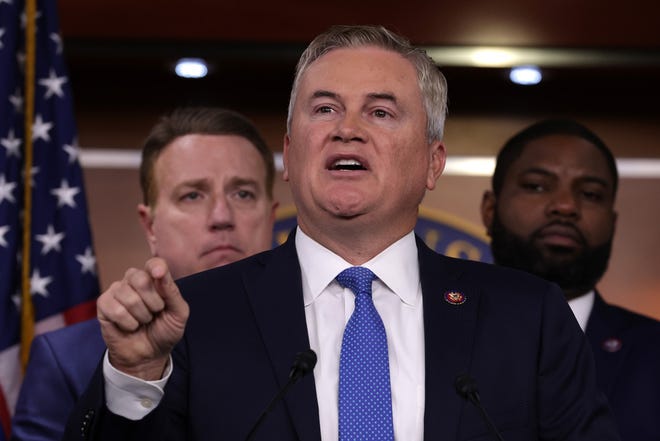A new Congress with new priorities: What to know on investigations, the fate of Biden's agenda and more

WASHINGTON–The House speaker's gavel will soon be held by a Republican, and with that change will come new priorities, a series of investigations and partisan gridlock that could bring President Joe Biden's agenda to a crawl, if not a full stop.
House GOP leader Kevin McCarthy, who is running to be the next speaker, has made clear in the weeks between the Nov. 8 election and Jan. 3, when the new Congress is sworn in, that Democrats would no longer have one-party rule of Washington.
In fact, he's been counting down.
"In 11 days, the new House GOP majority will change the direction of our country," he said on the House floor Dec. 23 before voting against a $1.7 trillion spending bill.
Earlier in December, McCarthy noted Democrats would lose one-party rule "in 17 days."

And on Dec. 2, he offered a bleaker warning when responding to released Twitter emails that showed company employees debating how to handle news about Hunter Biden's laptop.
"In 32 days, the new House Republican majority will get answers for the American people and the accountability they deserve," McCarthy said in a statement.
Starting Jan. 3, it will become clear how a House GOP majority will change the direction of the country. Here's what we know so far:
Investigations to come
Republicans only control the House, meaning legislatively, there’s not much the GOP can do as long as Democrats control the Senate and Biden wields the veto pen. Instead, Republicans can leverage their investigative power.
On the table, expect the GOP to flex its muscle in all sorts of oversight related to the White House, COVID-19, the southern border and more.
“Republicans have been ready to hit the ground running,” said Alyssa DaCunha, co-chair of law firm WilmerHale’s congressional investigations practice. “I think the question is what’s not going to be on the table.”
One lawmaker to keep an eye on is Kentucky Rep. James Comer, who is slated to chair the House Oversight Committee, arguably the premier investigative committee in the chamber.

Comer has promised extensive investigations into Hunter Biden’s financial dealings and compliance with tax laws, concerned about whether Joe Biden has been compromised by son Hunter Biden’s business interests.
In search of the perfect president:What Americans say they want, from age to gender
“If Mr. Biden’s family members have deals with foreign adversaries, it could compromise his decision-making as president in a way that threatens national security,” wrote Comer in an op-ed in the Wall Street Journal.
Also pay attention to Ohio Rep. Jim Jordan, who will likely chair the House Judiciary Committee.
Jordan is expected to open an aggressive probe into the Department of Justice for its search of former President Donald Trump’s Mar-a-Lago residence and his handling of classified documents.

What can they get done?
Despite anticipated partisan gridlock that could span two years, the Republican-led House and Democratic-led Senate will have to work together to pass the next annual spending bill or risk a federal government shutdown.
There may be some other areas of consensus, especially as both chambers have paper-thin majorities and will have to work across the aisle to get anything done.
Both parties want to rein in Big Tech.
Republicans want accountability for what they see as censorship of GOP members and perceived collusion between Big Government and Big Tech and bias against conservatives.
Democrats have focused their probes on antitrust issues, the tech industry's handling of hate speech, the rise of white nationalism, the link between social media and eroding mental health, and more. .
Though the parties have different viewpoints, they both claim to want accountability. And they have enough moderates willing to work across the aisle, such as Democratic Sen. Amy Klobuchar of Minnesota and Republican Rep. Ken Buck of Colorado, who have already worked on antitrust legislation.

It's unclear what kind of legislation both parties might agree to, but in the coming months it's possible House and Senate committees will have tech executives as witnesses in various hearings.
Republicans and Democrats also may be able to work together to reduce inflation, but again, both parties have different ideas about how to do that. The GOP has been largely focused on efforts to reduce spending, while Democrats have continued to push social spending programs – like the axed child tax credit – to help American families.
What's off the table
With the end of total Democratic control of Congress, it’s extremely unlikely key Democratic priorities will have any shot at getting through a now GOP-controlled House.
After the Supreme Court overturned the constitutional right to an abortion in June, House Democrats moved legislation to codify abortion rights. The efforts ultimately failed in the Senate, but they were signs of a Democratic commitment to eventually enshrine abortion rights into law.
'We feel more secure':As Respect for Marriage Act passes, same-sex couples share tentative enthusiasm
That aspiration is unlikely to see support from a GOP-led House of Representatives, as Republican leadership heaped praise on the Supreme Court decision last summer.

Not only that, any chance to revive the historic expanded child tax credit – a key Democratic priority – is likely dead with Republicans controlling the House.
Democrats attempted to push through the credit in the omnibus spending bill passed near the end of December, but Republicans opposed the measure in negotiations, saying the credit would increase inflation levels.
What is not totally off the table is continued aid to Ukraine as it still defends itself from Russia.
McCarthy, the favorite to become speaker of the House, has said there will be no “blank check” to Ukraine if he is speaker.
But on the Senate side, there is wide-ranging bipartisan support for providing more military and financial assistance to Ukraine. With McCarthy's skepticism, expect to see some back and forth between the House and Senate on how much and what kind of aid should be provided to Ukraine.
But even with signs of more partisan warfare in D.C., the White House has signaled some optimism about working together with Congress. Biden pointed to the recent passage of the $1.7 trillion omnibus bill – which passed with the support of 18 GOP senators and nine members of the House – as evidence that Republicans and Democrats can find accord in an increasingly divided Washington.
"This bill is further proof that Republicans and Democrats can come together to deliver for the American people, and I'm looking forward to continued bipartisan progress in the year ahead," Biden said.







